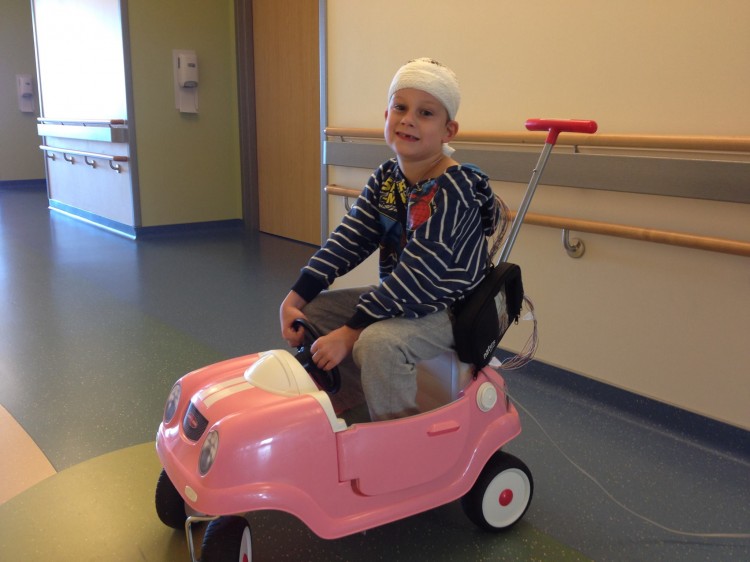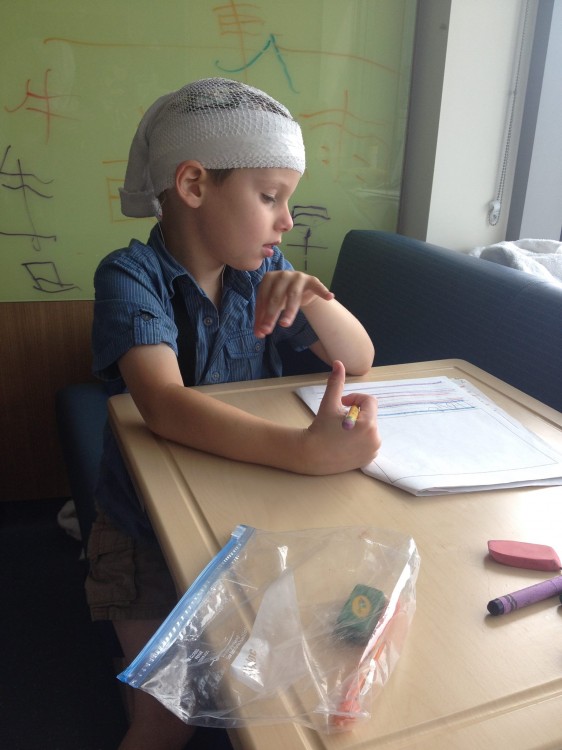 My son Bunz does an awesome job of enjoying life while navigating two disabilities: cerebral palsy and epilepsy. In his seven years on this planet, we’ve met with developmental pediatricians, neurologists, epileptologists, physiatrists, neuropsychologists, school specialists, physical therapists, occupational therapists, speech therapists, feeding therapists, gastroenterologists, therapeutic horses, aquatic therapists, music therapists, craniosacral therapists, myofascial therapists, chiropractors, Feldenkrais and Anat Baniel practitoners, surgeons, podiatrists and others to help him navigate these challenges.
My son Bunz does an awesome job of enjoying life while navigating two disabilities: cerebral palsy and epilepsy. In his seven years on this planet, we’ve met with developmental pediatricians, neurologists, epileptologists, physiatrists, neuropsychologists, school specialists, physical therapists, occupational therapists, speech therapists, feeding therapists, gastroenterologists, therapeutic horses, aquatic therapists, music therapists, craniosacral therapists, myofascial therapists, chiropractors, Feldenkrais and Anat Baniel practitoners, surgeons, podiatrists and others to help him navigate these challenges.
They all ask the same thing: “What do you want me to know about your child?”
“What do you want me to know about your child?”
“What do you want me to know about your child?”
“What do you want me to know about your child?”
Well, what I really want you to know about my child is not relevant to the task at hand. But then again, maybe it is. It’s relevant to Bunz, after all — to his life and perspective and understanding of where he fits in this world.
Depending on how you think about it, What I Want You to Know About My Child may have nothing to do with the care you provide him in this moment. Or it may have everything to do with it.
Because what I want you to know is this:
That while my child fixates on your overgrown beard during our consultation, deep down he’s sensitive and he’s listening. To us. To all the things we’re saying – in front of him, right now – things he can do or can’t do, things he struggles with or finds challenging. I want you to know that when you say he has good muscle tone, he wears that routine observation like a badge of honor and asks me on the way home what it might mean. Whether there’s a shred of something to be proud of in those words. Because like all of us, he wants to be great. He wants to belong.
He wants to be enough.
I want you to know that some of the things you observe to be difficult for my child are the very things he’s worked hard to improve on for a year or sometimes more. And so I want to tell you – quickly before you say anything to defeat his sense of accomplishment – that he’s come a long way. Even though we all recognize he’s not there yet. Even though he might get there eventually, or he might not. But I want you to know that for kids like Bunz, the way from “here” to “there” is a progression of baby steps. And he’s continually taking those steps.
I want you to know that even though we’re here to talk about all the things that are difficult for him, much of his life is spent being good at things. He’s good at math, reading and spelling, for example. He’s good at shaking hands with elderly people in nursing homes and looking into their eyes with a sincerity and warmth that belies his age. He gives amazing hugs and plays songs by ear. He’s good at remembering birthdays, noticing new haircuts and telling clever jokes. He’s good at making strangers laugh and bringing people together and diffusing tense situations. He has no ego and so he’s good at living his higher purpose.
I want you to know that whatever worked for the other kids probably won’t/might not work for Bunz. It takes creativity, music and a bit of a smartass personality to get him on board with whatever program you have in mind. I know this complicates things. Bunz pushes all of us to rise to the challenge, and I guarantee if you can make this work, you’ll be a more resourceful practitioner for it.
I want you to know that Bunz will talk about you long after we get home. A lot. Mostly he will ask us to invite you over for dinner and then insist you move in. But sometimes he will inform us that you had food stuck in your teeth. I’m sorry in advance for those times.
And finally, I want you to know that this kid has big dreams. That the first few times he met children who were nonverbal, he was visibly and dramatically shaken – he wanted so badly to help those children speak. One night a few weeks ago, he announced in a sleepy voice that he wants to be a “speech teacher” so he can help his friend Ben and every child learn to speak. But also, he told me as he drifted off to sleep, he still really wants to be a policeman … and so maybe he’ll drive his police car fast to the school to teach those kids.
I want you to know these things so we can help my son — and other kids like him — understand with certainty that their challenges don’t define them. That challenges evolve and change and sometimes even fade away, but character and strength remain.
I want you to know that my son is a character, for sure. But mostly, I want you to know that he is strong.
And he is Enough.
Follow this journey on Team Bunz.
Do you have a story about your experience with epilepsy? Please send it to epilepsy@themighty.com and include a photo for the story, a photo of yourself and a 1-2 sentence bio. Check out our “Share Your Story” page for more about our submission guidelines.

